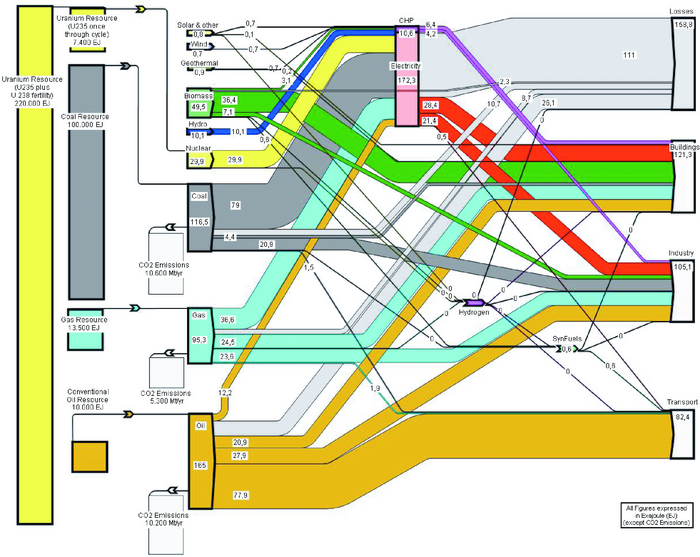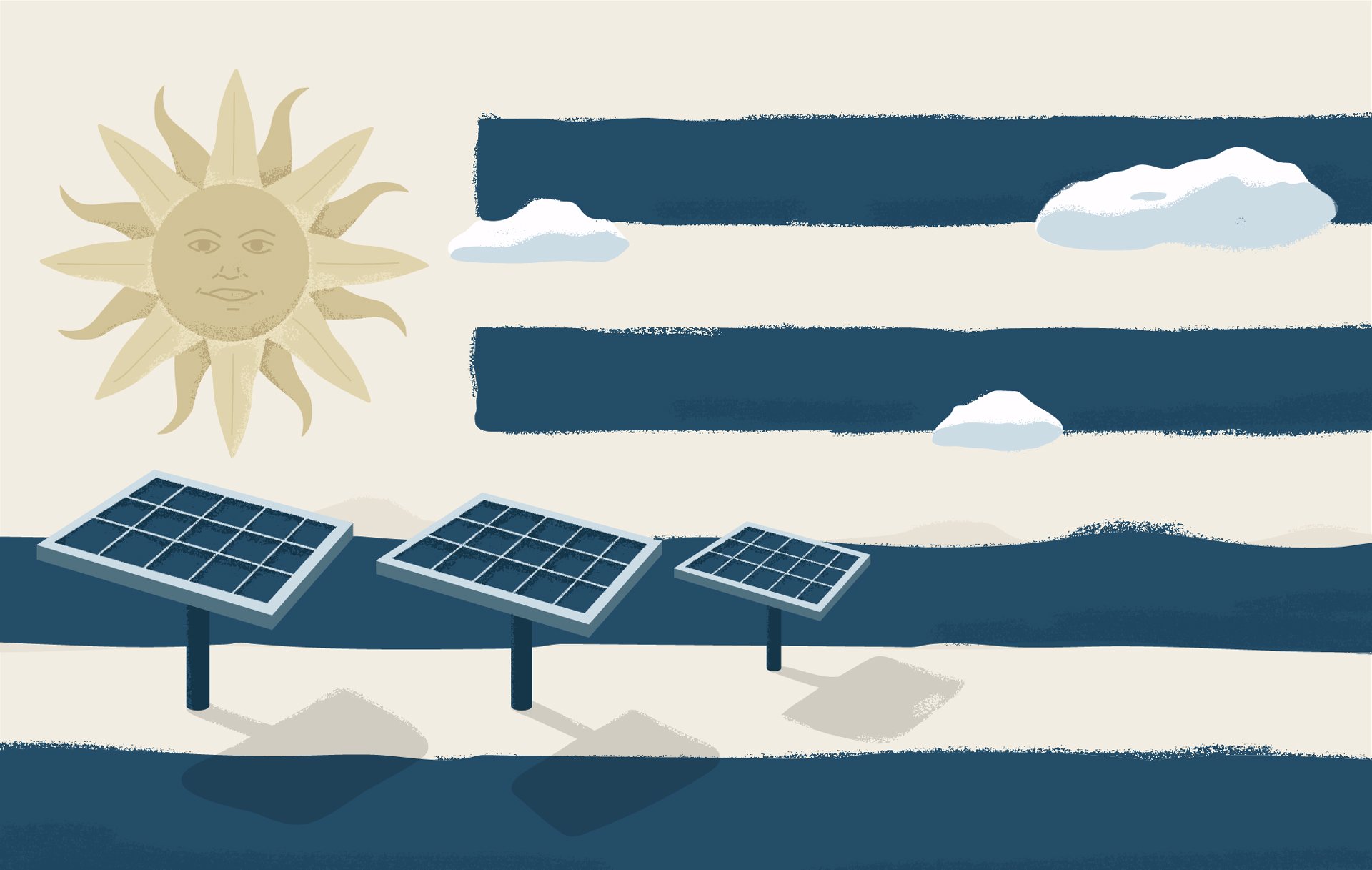“with wind the single-biggest contributor… Power production costs have declined “by almost half” … And the clean energy sector has created 50,000 new jobs… Ask me what was the impact on the electricity sector in Uruguay after this tragic war in Europe — zero.”
I actually never thought of it like that, if you’re not partaking in the trade of fossil fuels, you are removing yourself from a lot of potential conflicts and “who support who” ordeals.
Wait until we have our first Wind War.
That’s what we call it after eating beans all day
We’ll control the wind and rain. It was a saying in soviet block during cold war and elites really thought they would. By spraying chemicals in clouds etc. Disgusting.
Cloud seeding? That’s very much a real thing, although its effectiveness is disputed.
A bit of info about an “experiment” on the subject https://en.m.wikipedia.org/wiki/Operation_Popeye
…Except China, where most renewables are produced.
deleted by creator
We’ve been at ~95% renewable for years actually, but now we’ve reached 100%
Meanwhile in South Africa, we’re having blackouts while being almost completely dependant on coal.
I remembered reading many years ago about large solar plants in SA and I wondered what happened to that. Apparently Zuma happened: From a world leader in renewables, to years behind, thanks to Zuma and his cronies.
But I bet the companies make a lot of profit on that, so all good \s
Yep they kick back to the politicians so perfectly to plan
You know you need a lot of sun and wind for renewable energy?
Pretty sure South Africa has too little of it unlike those sunny and wind torn countries like, don’t know… Germany?
Looks like that’s just the grid? I’m sure there’s more to go for transportation and eliminating the need for generators and gas, but this is a great start!
does anyone ever assume that it’s anything other than the grid when it comes to some article like this?
electricity is’t the majority of the energy consumed in nearly any country.
it’s a easy way to keep confusing less vigilant people by calling electricity as energy.
Just call things the way they are.
You’re right; 2/3 of worldwide energy is actually waste heat.
https://www.businessinsider.com/most-energy-still-comes-from-oil-2015-10
Here’s the chart from 2007: Waste heat / losses are in the top right, although it doesn’t show the transport sector losses which are higher than for coal generation.

What this means is that when we fully electrify all sectors, by using renewable energy such as wind and solar, our total energy generation capacity will only need to be about 1/3 to 1/4 of what we currently produce today to fulfill our current energy needs. That’s huge.
Correct me if I’m wrong, but electrifying a process doesn’t automatically make it not produce waste heat, right?
The reference to waste heat could include the heat from burning fossil fuels that isn’t turned directly into work. Which is a lot.
So you’re right, there will still be some waste heat and the reduction in production needs won’t be that drastic. But it’s still a significant chunk of the total!
Yes of course, but a lot of energy is currently also used for heating things in cooking steel, chemical industry, concrete, etc. Those processes need energy as heat and directly produce waste heat. I agree it’s probably still significant. It’s just wrong to reduce energy consumption to “making things move”.
Changing your energy generation from burning something to turning a turbine with wind power, hydropower or geothermal power. Or just using solar, means that you have no waste heat for electrical generation.
Waste heat is only created when you burn a fuel to boil the water.
If you heat things electrically you still generate waste heat. Think electrical stove and its bigger industrial counterparts.
that’s not quite right and mixes couple things
you have production losses and transmission losses. then you have waste heat used for household and industrial heating.
now you would also have to produce that portion electrically.
For instance in winter heating requirements of a typical house are 2x that of the electricity used.
I mean I doubt any reasonable person would think that literally every household in Uruguay has replaced their gas stove with an electric/induction stove and that they use only AC/heat pumps and everyone has switched to an electric car and every bus has been converted to a trolley and or Battery/Hydrogen Electric
and a bunch of other stuff.
Too bad it’s far too late.
Amazing
53,000 barrels/day
It looks like Uruguays oil consumption has flatlined since about 2014. I can’t find any newer data than 2016 but here’s my source:
Presumably mostly for transportation sector. EV adoption should lower that.
Indeed, I have some friends who live in South America and they tell me that electric scooters and three wheelers are becoming very popular. Imported from China.
how those middle east prince now can buy more hookers and supercars if u guys not using oil
Very cool. I hope they are looking at reducing demand for power as much as increasing production.
Actually, with clean sources of electricity like wind and solar, the amount consumption doesn’t matter. It only matters if there isn’t enough for everyone, or the power comes from non-green sources (coal etc)
I don’t understand the objection to greater efficiency… Even renewables are not without their own environmental costs of mining, transportation, manufucaturing etc. If we use less power we can more easily transition to renewables, with less disruption to the environment.
You’re right! There’s nothing wrong with efficiency and teaching people to be less wasteful, however I believe including it in your argument for renewables means muddying the message.
Talking about getting production to 100% renewable puts the onus on governments and power companies to change.
Talking about efficiency is about getting consumers to use less, and allows energy producers and politicians to point the finger at people leaving their lights on unnecessarily rather than getting on with the job of making more renewable energy.
This is of course speculation on my part
Efficiency doesn’t have to be consumer led, though. It could be stuff like higher building standards and subsidies for insulation, subsidies for heat pumps for AC and hot water, even seemingly trivial things like free/subsidised LED bulbs can add up (there is still a significant amount of non-LED bulbs in the wild in many countries).
deleted by creator
Nuclear fanbois: GASP! How dare you?!
Well, not every country has wind farms or water turbines as viable option. You know, geography and stuff…
I am not intending to add fuel to this fire of a comment thread, however I was wondering if Stockholm, Sweden’s solution of burning culled rabbits, for fuel, would be considered ‘reneweable energy’?
deleted by creator
My country of Belgium. Unless by “100 % renewable” you include fossile gas generation “offset” by summer’s overproduction (which would be disingenuous).
Middle of January: 100% overcast for weeks on end with only 8 hours of daylight, some days with little to no wind. Geography does not support more hydro or any geothermal generation. Country is way too densely populated for meaningful biomass fuel production (not that it is a climate-friendly practice anyway).
Maaaybe there is a stretch argument to be made about offshore wind/water, but we have relatively little coastline and very busy waterways due to having some of the busiest shipping ports of Europe, so I doubt even in the most optimistic scenarios this can fill the gap during the winter season.
For any meaningful definition of the concept, we can’t be 100 % dependent on nationally-sourced renewables until we figure out much much denser and cheaper long term storage solutions. Which is alright - maintaining existing nuclear reactors is an option (barely due to legaislative sabotage pushed by the “greens” but a couple gigawatts is nothing to scoff at) and more importantly we are part of the EU which will hopefully allow us to buy southern European solar/wind via HVDC lines in the future, and we’re already very dependent on French nuclear. (Also we don’t have to be 100 % independent to push for renewables, perfect mustn’t be the enemy of good and all that)
allow us to buy southern European solar/wind
Yeah, I think this is the future for small, densely populated countries without clear sources of renewable energy
deleted by creator
Doesn’t Belgium just import electricity from the European energy grid? You guys have access to Norwegian hydro, German coal, and French nuclear.
Yes, in rather large amounts since we aren’t always self-sufficient (even with fossil gas).
Almost all of continental Europe is part of one, synchronous grid. Right now I’m using electricity simultaneously being produced in Belgium, Portugal, Ukraine, Turkey, and even Morocco; although for accounting purposes we calculate the difference at the border, electrons don’t care.
deleted by creator
You intentionally ignored the part about being overcast for weeks during the winter, the time of the year where they need the most energy. Tell me how solar can heat up the entire country when it’s overcast and there are only 8 hours of day light, which reminder, is covered by the overcast weather that stays for weeks
deleted by creator
Vatican City /s
I think that there are constraints for certain countries, but the majority probably could. And when they can’t, it should be solved by cooperation and trade, IMHO.
Then maybe those countries shouldn’t exist.
Though that’s based solely on your example.
I’d be willing to bet most people you’d categorize as “nuclear fanbois” would be perfectly happy if hydroelectric was providing 65% of the grid power.
The problem is that that renewables are pushed as a “one size fits all” solution that they really aren’t.








